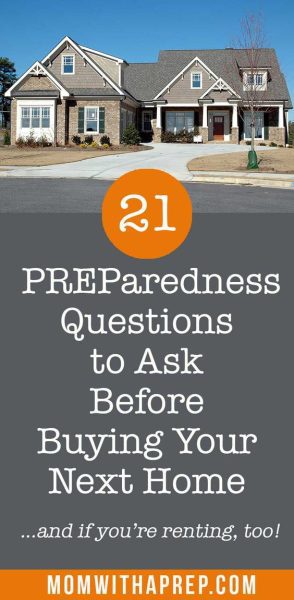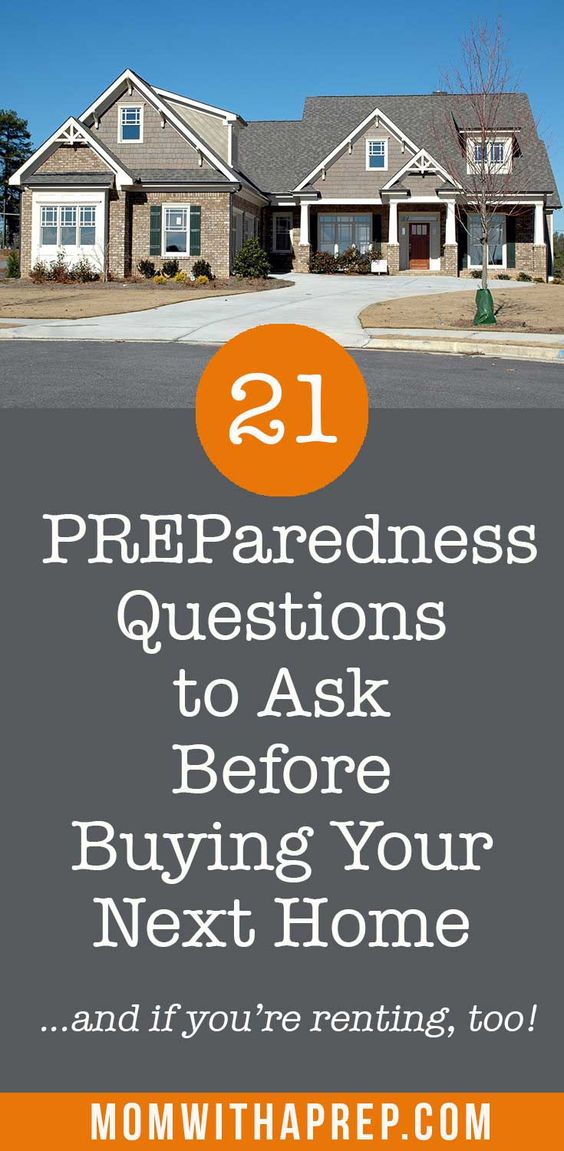Don’t let buying a house in the right neighborhood, with the right schools, and the right style, be the only factor in your home buying decision. Learn to look at home buying with PREPared eyes – how can your home buying can benefit your PREParedness plans.

Are you looking to buy a home in the near future? It does seem daunting to make sure you’re in the right neighborhood, in the perfect school district, with the perfect style house.
But what if I told you those things may be secondary to what you really need to be asking if you’re looking at home buying with a preparedness mindset? Let me share our story.
When we purchased this house, we were newly married, about to be homeless we thought, and we didn’t have a large budget. We’d been looking for quite awhile in a bedroom community that was safe, not too developed, and focused less on retail space, and that had an awesome school district.
But our budget was tiny. We didn’t have the best credit. We were cash poor in a buyer’s market. So our focus really was buying the worst house in the best ‘suburb’, and we’d be able to fix it up. Little did we know that life wouldn’t exactly work to our benefit that way. The major flaws we knew we had are still mostly with us. But those can be overcome with time.
Then we changed our way of thinking …
The thing we weren’t concerned with, back then, was emergency preparedness. Our mindset has changed, over time, in how we want to raise our family, be more self-reliant, and be better prepared for hard times.
We want to be able to raise chickens, to have a better source of water, to have room to grow a garden, a small orchard, put in a large work shed, etc. We want to have a safe space in the event of a tornado. We’d love to have more storage room for a deep pantry and supplies. Sadly, our current location just can’t accommodate those needs in the way we wish it could now. It doesn’t mean we can’t have those things, we just have to be much more creative about it.
So while we need to make the best of what we currently have, and there is no accounting for a major change in mindset, here are some questions we wish we’d asked ourselves before we picked a spot, and questions we will be asking ourselves as we begin looking for a new home in the future.
By the way, this is going to assume that you have the money and are qualified for your house purchase ahead of time.
21 PREPAREDNESS QUESTIONS TO ASK BEFORE BUYING A HOUSE
Many of these questions will pertain mostly to suburban living, as the reality is that many of us just can’t get out to more rural locations. You can use them to keep in mind for living in urban areas, as well as for renters.
1. WHERE IS THE PROPERTY LOCATED?
Location really does matter – do you envision yourself in the country, on fifty acres of land away from neighbors? Or is living in a suburb more to your liking? What about an urban location…and the challenges it brings? Do you need to live near an airport or have a quick drive to an interstate system because of travel? Would you prefer to live in a developed area with lots of access to shopping, jobs, people, or do you see yourself in an area where you’ll have to rely on UPS deliveries and each other for company?
2. WHERE IS THE CLOSEST WATER SOURCE?
- Is your home near a readily accessible water source?
- Do you have a way to haul water?
- Do you have a well? What about a manual pump if the electric pump no longer works in a power outage.
- What is the quality of that water source?
TIP: Build your own gravity fed water purification system
3. CAN I HAVE SOME CHICKENS?
When thinking about how you can better prepare your family and create a homestead wherever you are, check the ordinances in the city/county you are looking to buy in. Can you have livestock? What are the requirements for outside water storage? Can you grow a garden larger than that for a kitchen? What about a ham radio antenna setup?
(Don’t have time to read the whole thing? PIN THIS ARTICLE to Pinterest to read later!)
4. IS THERE A HOMEOWNER’S ASSOCIATION (HOA)?
Are you moving into a neighborhood where an HOA reigns supreme on how you can manage your own property? Look at their bylaws as they can be even more restrictive than city and county ordinances. And just like with municipalities, an HOA can change bylaws to be even more restrictive than they are today.
5. WHAT’S WRONG WITH THIS HOUSE?
Of course, we want a home that is as turn-key as possible. But if you love DIY projects to make a house your own, take into consideration the magnitude of those home improvement projects. Will they take all of your time, money and effort to repair, leaving you unable to develop a garden, maintain livestock, work on preparedness skills and plans.
- Roof Replacement?
- Basement moisture?
- Foundation issues?
- Water damage?
- How much normal monthly maintenance and upkeep will the house/land require?
In some states, a disclosure form is required when selling a home, but in states that don’t require it, you need to ask the pointed questions about any home repair/issues that come along with the home. And never skip a home inspection!
6. WHAT IS THE SOIL HEALTH?
Soil health, in any garden, is majorly important. And yes, you can amend soil to benefit your garden production, but it would be nice to know, ahead of time, the health of the soil or the kind of soil you have. Can you sneak outside and take a look? Get a sample? You can do a quick at home test, or if you have time, send a sample into your local extension agency to have it tested. You can pick up this quick soil test at Amazon or other gardening locations. Ask questions about how the property has been used in the past, what chemicals were used to treat the yard, pests, or even what was stored in the shed near your ideal garden plot.
7. HOW SAFE IS THE NEIGHBORHOOD/CITY?
Safety plays a large part in our preparedness concerns. Living in an area with crime does not put one in the best personal safety context. If you are concerned about the crime in the area you want to live in, check with the local police department or sheriff’s department for crime reports of not only the city, but even the neighborhood. Check into Facebook groups dedicated to the area (neighborhood watch groups or HOA’s often have groups to communicate, and have great info). Check the Sex Offenders’ Database if that is a concern for you.
• READ MORE: Basic Safety Tips for Women
8. HOW MUCH STORAGE DO I HAVE?
How much storage does the home have? Is there plenty of room for a large deep pantry, extra space for your extended food storage in a safe environment. Do you have adequate room for outdoor storage? Can storage be reconfigured to meet your needs? Do the home have a basement or attic that can be used?
9. CAN I FEED MY FAMILY?
Do you have room to have a garden? Can you build a garden vertically? What about creating space by square foot gardening or doing a lot of container gardening? If you are looking at an apartment – is there a balcony large enough to grow in containers or a public garden nearby?
Additionally – ask the question about trees and animals. Do you have room to put a chicken coop or rabbit hutch in? Do you have enough acreage to house larger livestock well? What about a small orchard or even just a few fruit tress or bushes? Are you starting from scratch or does the property already have some of these benefits you can enjoy immediately?
10. WHAT IS THE NEIGHBORHOOD LIKE?
A look around your neighborhood can tell you a lot about your neighbors. Are homes and property well maintained? Come back and visit a few times at different times of the day to see what the area is like at night and on the weekends. What about the cars? And side yards? A lot can be said about the condition of both in a neighborhood. Be ‘friendly’ and nosy at the same time – talk to the neighbors of the home you wish to buy. They’ll have a lot of information you might not be able to get from the home owner or real estate agent.
11. WHAT IS THE HOME’S HISTORY?
Much like question five above, you want to know the past history of the home, as well as the current issues.
- When was the mechanical system last inspected? Is it still under warranty and do you have the paperwork?
- When was the roof last repaired?
- How old is the water heater?
- When was the septic system last drained? Is it large enough for your family?
LOOKING FOR A LIKE MINDED GROUP OF WOMEN LEARNING TO BECOME MORE PREPARED?
Join PREPAREDNESS FOR MOMS!
12. IS THERE PET DAMAGE?
We all know that a quick carpet cleaning is necessary when moving into a house. But damage from pets goes much deeper than a quick cleaning. Taking a black light to the home you want to purchase can give you a wealth of information about pet damage that may have been incurred which you might not see from a cursory walk through of a home. Pet urine can stain the sub-floors of any home, which might not be readily apparent with the smell of cookies baking in the oven. But wait until the first humid day or when the heater kicks in, and you may smell a whole different story. Not only might this be a health hazard for you – it’ll be a lot to repair if you find a large problem after the fact.
13. CAN I PEEK BEHIND THIS CURTAIN?
Well, don’t really ask. Just do it. Move some furniture, look in hidden corners, check the attic, look behind things in the basement. You’re looking for pest infestation, water damage, floor damage, foundation damage.
Don’t be timid. You’re looking at purchasing this home – it’s the biggest investment you’re likely to ever make. If someone is being particularly worrisome over you inspecting the property, that’s a big red flag for you. They may be a bit squeamish about you touching their stuff, but do it anyway. Just be polite and considerate.
14. IS THIS HOUSE FULL OF GAS?
Not only do you need to be prepared for how to maintain a gas line in a home, does the home have a need for a carbon monoxide detector? Do you need to look at replacing the smoke alarms? What about radon gas – when was the last time a test was done and is there documentation on it? And speaking of gas…what’s the health of the septic system again?
• READ MORE – Strategic Relocation by Joel Skousen
15. WHERE ARE THE UTILITIES?
You need to understand where the utilities are located for the home. Don’t wait until you’re moving in and notice the smell of gas, and realize the previous homeowners damaged the gas line when they moved out. Know exactly where those cutoffs are so that you can do a quick shut off in the case of an emergency. Be sure not to turn gas back on until you’ve had the gas company out to inspect.
You’ll also want to know exactly where the electrics panel is, and if you need to upgrade it before making that decision to buy. The same goes for the mechanics for the furnace/air conditioning, and any water purification systems the home may have set up.
Even a small issue of where your mail box is located may make or break your decision about purchasing a home. Do you have to travel to another part of the neighborhood to pick up your mail?
16. WHAT ARE THE NATURAL DISASTERS COMMON IN THE AREA?
This will be more important if you are moving to a part of the country you may not be familiar with. Are earthquakes, tornadoes, ice storms, mudslides, hurricanes, wildfires or droughts common? You may not need to find a different location, but this will change your preparedness plans in the future.
• Additional Reading: How to Prepare for Tornado Season or other Severe Weather
Pin this article to your house hunting or emergency preparedness board!
17. IS THE HOME IN A FLOODPLAIN?
While you’re likely to find out at closing if no one has bothered to say anything before, make sure you understand the designation of the neighborhood where the home is located. You will have to carry additional insurance (ask the buyer for previous insurance bills for this), but if you’re in an active floodplain, you want to know because it will effect your preparedness plans in a big way! FEMA offers a free floodplain map that you can check on your own if the information isn’t readily available (and you might want to think hard on buying a property from an agent or buyer who don’t disclose that information).
• LEARN MORE: Last Minute Evacuation Tips I Learned from Hurricane Harvey
18. WHAT ARE MAN-MADE DISASTERS THAT ARE COMMON TO THE AREA?
Man-made disasters may be a bit of a misnomer here, but like natural disasters, man-made disasters can throw your life upside down. Things to consider are:
- Industrial area – plant explosions, nuclear facilities,
- Dense urban population – is your area prone to demonstrations, a target for violence,
- Military installations
- Traffic – any populated area has their own version of ‘bad traffic’, but is your dream location in the middle of a heavily congested traffic area that makes escaping a disaster harder?
19. IS THE GOVERNMENT FRIENDLY TO MY WAY OF LIFE?
If part of your preparedness plan is to be able to defend yourself against acts of violence to you, your family, and your property, you’ll want to be sure you fully understand the gun laws in your state and local municipalities. If educating your children on your terms is important – what are the homeschooling laws like? Is your state a high tax state? Is it well known for being a nanny state or more libertarian? Does the state conservative or liberal – coinciding with your particular belief system? Is your area on the rise in growth and development or on the bottom? Is your state and local government supportive of self-employment?
20. HOW WILL WE STAY WARM?
If the home you are looking to purchase has electrical utilities, chances are they’re going to go out. Even if you have natural gas, you may experience service outages due to natural disasters, etc. So you need to look for alternative ways that your home can be made a safe haven in the event of a winter storm. Do you have a wood burning fireplace? Is your home powered by propane with a big enough tank to make it through a hard winter? Do you have room to have a wood pile or even enough trees to cut your own if needed?
• ADDITIONAL INFORMATION: 10 Ways to Keep from Freezing in the Winter
21. IS THERE A SAFE SPACE?
A safe space, in this instance, is a place inside the home where you can run for shelter in the event of a tornado, hurricane or even a break-in. If you are looking at a mobile home, chances are, unless you have a separate tornado shelter on your property, there is no real safe space in the house. The big trend in tiny home living also rarely offers a safe space from natural disaster if your area is prone to them. Is the home built with an interior safe space that you can get to – a bathroom or basement?
MORE QUESTIONS?
I hope that these questions help you begin to develop a mindset for preparedness in your next home purchase – whether you are buying an already developed property or building your own. The questions can be put to any property and location that you want to be in – just be mindful of your goals, your needs, and your future plans.
There may be many more questions you’ve thought to ask. Please drop them in the comments below! I’d love to know what else you find important, or any experiences you have had!
Good luck on your new home – wherever you decide to nest!
Becky is a wildlife enthusiast and pet and livestock care expert with a diploma in canine nutrition. With over a decade of experience in animal welfare, Becky lends her expertise to Simple Family Preparedness through insightful info about pets, livestock, bee keeping, and the practicalities of homesteading.


